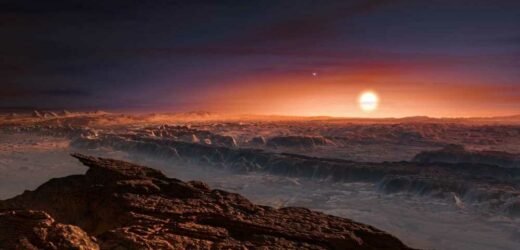A WATER world relatively close to Planet Earth could be teeming with alien life, scientists have claimed.
French astronomers have performed a new analysis of a recently discovered "second Earth" planet called Proxima b, which has exactly the right sort of conditions to sustain extraterrestrial organisms.
The mystery world orbits around Proxima Centauri, a red dwarf star that’s just four light years away.
It exists in the star's "goldilocks zone", which means it is far away enough from its sun so that water doesn't get boiled, but close enough so that it doesn't freeze.
Now stargazers from The French National Center for Scientific Research have performed calculations which indicate that Proxima b is an "ocean planet" like Earth – suggesting life may be teeming in its alien sea.
"Contrary to what one might expect, such proximity does not necessarily mean that Proxima b's surface is too hot for water to exist in liquid form," the astronomers said in a statement.
"The planet may very well host liquid water on its surface, and therefore also some forms of life,"
Related Stories
a whole new world After Proxima b second Earth discovery, how many other Earth-like planets have been found?
Planet orbiting Earth's 'closest neighbour' star could be home to ALIENS
Russian State TV calls Trump an 'agent' after White House meeting
Sexperts call for Nasa to fire condoms into space so ETs and humans can get it on
Proxima b is probably "covered by a single, liquid ocean 200 km deep and "surrounded by a thin, gassy atmosphere", the French astronomers added.
Scientists are trying to figure out a way of getting a robotic probe to the planet to see if it is home to alien organisms, although this is not a mission many of us will live to see.
Using current rocket technology, it would take 76,000 years to get to our nearest star.
However, there is hope that “light sail” technology currently under development could allow us to send a robotic probe to the planet in about 25 years.
Earlier this year Dr Guillem Anglada-Escude, from Queen Mary University of London, led the international team of astronomers who first discovered the water world.
She said: “Succeeding in the search for the nearest terrestrial planet beyond the solar system has been an experience of a lifetime, and has drawn on the dedication and passion of a number of international researchers.
“We hope these findings inspire future generations to keep looking beyond the stars. The search for life on Proxima b comes next.”
Dr Mikko Tuomi, from the University of Hertfordshire, added: “‘According to the findings the planet has a rocky surface and is only a fraction more massive than the Earth.
“It is the closest possible exoplanet to us and may be the closest to support life outside the solar system.”
We asked Nick Pope, a British researcher who used to run the Ministry of Defence’s UFO investigation department, if he thought we’d find aliens on the planet.
He said: “Many people believe there are aliens out there and now it’s possible that they’re our galactic next door neighbours.
“Every effort should be made not just to find out more about this planet, but to look for evidence of life – and maybe even intelligent life.”
Source: Read Full Article









